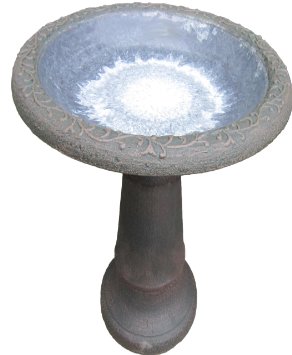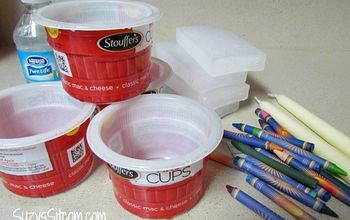What's killing my pumpkin?

-
It looks to me like powdery mildew, but that doesn't usually cause leaf dieback in the way you are seeing. For a really serious case, you may have to resort to a fungicide. It appears your pumpkins are growing under some kind of deck and I question how much sunlight they are getting. Shading conditions and those that limit air movement definitely exacerbate the problem.
 Douglas Hunt
on Sep 21, 2013
Helpful Reply
Douglas Hunt
on Sep 21, 2013
Helpful Reply -
-
Looks like powdery mildew. You might try removing some of the vines that are the most effected and discard. Using milk as a fungicide is the most recommended way to treat this problem. It's caused by both moisture and poor air circulation. You might try spraying daily with the milk/water, or just straight milk. Fortunately the fungus that cause this does not stay in the soil.
 Catherine Smith
on Sep 21, 2013
Helpful Reply
Catherine Smith
on Sep 21, 2013
Helpful Reply -
-
We had the same thing on our squash, and they're sitting out in the open, in a sunny, plenty of air circulation, and on sandy loam soil which drains well after a rain. We got 3 measly squash, which I'm hoping will make it to maturity.
 Judy
on Sep 21, 2013
Helpful Reply
Judy
on Sep 21, 2013
Helpful Reply -
-
I couldn't get my pumpkins, gourds, squash or cukes to grow or set fruit this year because of this same mildew. I used a fungicide and tried to remove old leaves and keep air circulating but we had rain almost every day for the months of June and July. I think it was just too wet. I'm going to cover my beds with plastic this fall and winter to hopefully kill out that nasty mildew spore. Any other suggestions?
 Mella J
on Sep 22, 2013
Helpful Reply
Mella J
on Sep 22, 2013
Helpful Reply -
-
I also had the same problem with my vine type veggies. It started with my squash, then the pumpkins, and cukes. I live in Eastern Ma. My son had the exact same thing happen to his garden also, he lives in R.I. We both tried several "fixes" but nothing has worked. I have never run across this problem before. I have raised beds (used them for years) I finally pulled the plants and discarded them, I'm cleaning out my beds and will try again next year. I hope to find out what happened though so there won't be a repeat of this problem.
 Janice Miller
on Sep 22, 2013
Helpful Reply
Janice Miller
on Sep 22, 2013
Helpful Reply -
-
A few years ago I had pumpkins and it got this on it. It is powdery mildew just as others have said. It will kill the plant if left untreated.
 Lynda Lingg
on Sep 22, 2013
Helpful Reply
Lynda Lingg
on Sep 22, 2013
Helpful Reply -
-
I had the same problem here in Canada. I managed t o get 3 good sized pumpkins and 1 lonely small squash.
 Linda (WHITEWEATHEREDHUTCH)
on Sep 22, 2013
Helpful Reply
Linda (WHITEWEATHEREDHUTCH)
on Sep 22, 2013
Helpful Reply -
-
Use white distilled vinegar on them..kills all fungus amd mildew wothout hurting the plant. Do it in the evening after the hottest part of the day. At least this is what worked for me....hope it helps
 Sherry Payne
on Sep 22, 2013
Helpful Reply
Sherry Payne
on Sep 22, 2013
Helpful Reply -
-
You can check with your extension office but I think Douglas Hunt is on the money. Here is a site out of Perdue that has some really good pictures and recommendations. www.extension.purdue.edu/extmedia/BP/BP-17/BP-17.pdf
 Leona G
on Sep 22, 2013
Helpful Reply
Leona G
on Sep 22, 2013
Helpful Reply -
-
Fungus. We had a cold spring, and the beginning of summer was very cool, and very very wet. Everything had fungus. Lawn included.
 Starla Swanson
on Sep 22, 2013
Helpful Reply
Starla Swanson
on Sep 22, 2013
Helpful Reply -
-
It's not powdery mildew, but has a similar look. I've had that problem in the past and know it only TOO well. The cold and wet make perfect growing conditions for the fungus. Sherry Payne's method does work. Be sure to dispose of the debris in the trash, not he compost.
 Starla Swanson
on Sep 22, 2013
Helpful Reply
Starla Swanson
on Sep 22, 2013
Helpful Reply -
-
I live in San Diego, a few blocks from the beach and also struggle with powdery leaf mildew every year on my tomato plants. I had a spaghetti squash plant volunteer from my compost which eventually succomed to it after producing 3 small squash. I was told my a vendor at a local farmers market that it comes on as a result of an imbalance in the soil which allows the fungus to perpetuate in the soil. She suggested worm castings be added to the soil. I did my research and found that can help to strengthen the soil. Last year I actually built my own worm farm from a You Tube tutorial. The casting strengthen the soil and last year I had a plant that lived all summer, through the winter and even produced a few tomatoes this summer! Never had that happen before.
 Swimom
on Sep 22, 2013
Helpful Reply
Swimom
on Sep 22, 2013
Helpful Reply -
-
Thanks everyone. I'll try the vinegar and let you all know.
 Vidya: Whats Ur Home Story
on Sep 22, 2013
Helpful Reply
Vidya: Whats Ur Home Story
on Sep 22, 2013
Helpful Reply -
-
Someone told me to try tea tree oil diluted with water. I also cut off some of the worst leave and the plant got a new set of leaves and 2 more smaller squash. Don't know if the tea tree oil was an answer but I would try it again.
 Lorna Paisley
on Sep 22, 2013
Helpful Reply
Lorna Paisley
on Sep 22, 2013
Helpful Reply -
-
Not sure of this makes anyone feel better but here goes...I planted pumpkins and gourds this year and while the vines grew like crazy and there were zillions of flowers, very few set and now the leaves have that same fungus/mold? on them. I asked a local farmer who owns a market and he gave me several reasons. The lack of fruit (pumpkins, gourds, squash, cucumbers etc) was because we had too many cold nights here all summer and WAY too much rain which causes the fungus. The other problem is the lack of honeybees to pollinate. As you may know our honey bee population is under attack and losing the battle. Most people dont realize just how much we depend on them to grow our foods and if something isnt done soon to stop this we are all going to be in one sorry state as far as our food goes. Most if not all the blame is being put squarely on the shoulders of huge companies like Monsanto and their genetically modified seeds. There is a coating on these seeds to protect them from various things like insects, fungus etc. The problem lies in how those seeds are planted. We apparently now have planting machines that work like a vacuum and they suck all that coating dust and blow it into the atmosphere. This in turn kills bees, birds etc. Has anyone noticed the lack of bats this year? They too are under attack and unless something is done we are going to be inundated with mosquitoes and other flying insects that bats eat. Sorry for sounding like an alarmist but this isnt a maybe thing, this is happening right now and could cause food prices to soar drastically. We all need to be writing emails, letters, making phone calls to our government officials and demanding that they make these companies change their practices before it is too late.
 Glenna Kennedy
on Sep 22, 2013
Helpful Reply
Glenna Kennedy
on Sep 22, 2013
Helpful Reply -
-
We are lucky in that we live down the road from an apiary. I see lots of bees in my flower garden so I know the pollinators are around. It was just too wet for vining vegetables and pumpkins/gourds. So true about the bees, and that is one reason I try not to use anymore chemical around my garden that I absolutely have to and try to buy non-treated seeds.
 Mella J
on Sep 23, 2013
Helpful Reply
Mella J
on Sep 23, 2013
Helpful Reply -
-
We need to all be buying non treated seeds and letting the stores that sell them know that we are boycotting chemically treated anything! Here in Ontario Canada we have banned the use of any or all weed/bug killers that are causing problems. There are lots of home remedies for bugs and weeds, there's no need for any of them. We need to get over this 'our perfectly manicured lawn' syndrome. No one ever died from dandelions! Even better get rid of most of your yards and plant native grasses and plants,zeriscape instead of wasting water on grass, and using noisy air polluting lawn mowers. My Mom god rest her soul, used to pick dandelions and make wine out of them or use them in salads! Her and my Dad grew all their own veggies without tons of chemicals and they lived to be late 90's and 75 years of marriage! We need to do our bodies a favor and go back to the way it used to be. You never heard of cancer until these giant companies started taking over our food supplies with chemically fed animals and plants.
 Glenna Kennedy
on Sep 23, 2013
Helpful Reply
Glenna Kennedy
on Sep 23, 2013
Helpful Reply -
-
Good for you Mella, more people need to follow suit. This drastic kill off of bees is startling to say the least. Most people have that 'so what ' attitude..it's just a bee....they have no clue that without bees/birds etc nothing would get pollinated and our food supplies would dwindle and then watch the prices go through the roof. Our children should be getting this as part of their education as well. Teach them young and they will be the change for the future.
 Glenna Kennedy
on Sep 25, 2013
Helpful Reply
Glenna Kennedy
on Sep 25, 2013
Helpful Reply -
-
Glenna, I'm with you. Without the insects, bees and butterflies in particular, we can kiss our horticultural future good bye and plan to start hand pollinating a wide variety of vegetables blossoms if we intend to eat. And as gardeners, anytime we can turn to an alternative to pesticides/fungicides we should. I hate saying this, but a large part of the world relies on US crops to feed their people, and without GMO's there would be starvation. This rock we live on is overpopulated. Simple facts. With that being said, I'm still not in favor of GMO's and all they mean to the environment. I want GMO labels on my food so I can make the choice. I want to know what chemicals are being used. I want to have options. Seed diversity is a huge issue, right next to the chemical warfare raging in the fields to grow our food. The more we grow at home, and help each other with information to sustain our gardens, the better off we will be. These blogs are wonderful for just that.
 Starla Swanson
on Sep 26, 2013
Helpful Reply
Starla Swanson
on Sep 26, 2013
Helpful Reply -
Related Discussions
If I put bleach in my fountain to kill mosquitos will it harm the bird
Sand in bird baths - mosquitos?
I heard recently that you can put sand in the bottom of a birdbath to help keep mosquitoes. Any validity to this?
How can I control blind mosquitos?
I retired and moved to Florida. I live by a lake. We get a lot of blind mosquitos. I don't like using chemical sprays. I don't want to hurt the wild life. Look... See more
How do get rid of mosquitoes of Japanese maple trees.
there every were help
Tips for a diy mosquito attractant for a bug zapper?
Which mosquito repellent plants can grow up a trellis?
I am planting mosquito repellent plants around my patio and would like to grow one up a trellis as a privacy screen



